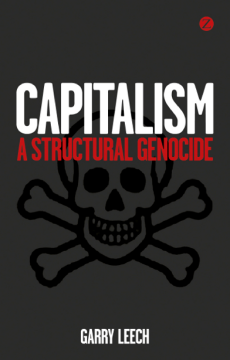
Additional Information
Book Details
Abstract
In the wake of the global financial crisis, and ongoing savage government cuts across the world, Garry Leech addresses a pressing and necessary topic: the nature of contemporary capitalism, and how it inherently generates inequality and structural violence.
Drawing on a number of fascinating case studies from across the world - including the forced displacement of farmers in Mexico, farmer suicides in India, and deaths from preventable and treatable diseases in Sub-Saharan Africa, as well as the unsustainable exploitation of the planet's natural resources - Leech provocatively argues that global capitalism constitutes a form of genocide against the poor, particularly in the global South.
Essential and eye-opening the book questions the legitimacy of a system that inevitably results in such large-scale human suffering, while going beyond mere critique to offer a more egalitarian, democratic and sustainable global alternative.
'Capitalism has long been known as unfair, exploitative and wasteful; and more recently as ecologically destructive. Garry Leech now moves the indictment to the next, and final, stage. With the precision of a skilled prosecutor and the moral force of an Old Testament prophet, Leech reveals the power that moves the world to be actively and structurally genocidal, responsible in its greed and cold calculation for no less than ten million excess deaths a year. As people now increasingly move to take on this deadly system now in profound crisis, they will find this an indispensable guide.'
Joel Kovel, author of The Enemy of Nature
'Leech argues, using convincing empirical evidence, of the destructive effects of contemporary capitalism, showing that the only plausible alternative is a socialist perspective.'
Samir Amin
'At this time of mass rebellions against the global status quo, Garry Leech puts forth a devastating critique of the capitalist system and the ravages it has inflicted on hundreds of millions of people around the world. This timely study will be of great interest to scholars and students. Beyond the academy, its rigorous analysis of the root cause of suffering and injustice on a mass scale and the vision of a socialist alternative based on human development and ecological sustainability will be vital for those on the frontlines of the current global revolt. This is a must read for those participating in the Arab Spring, the Occupy movement, the Latin American revolutions, the anti-austerity protests in Europe, and for all those fighting against the depredations of the genocidal system that is global capitalism.'
William I. Robinson, Professor of Sociology, Global Studies, and Latin American Studies, University of California at Santa Barbara
'Nearly short enough to be read in one sitting, but so powerful that its arguments will survive the ages'
Labor Studies Journal
Garry Leech is the director of the Centre for International Studies and a lecturer in the Department of Political Science at Cape Breton University, Canada. He is the author of numerous books including The FARC: The Longest Insurgency (Zed Books, 2011) and Crude Interventions: The United States, Oil and the New World (Dis)Order (Zed Books, 2006).
Table of Contents
| Section Title | Page | Action | Price |
|---|---|---|---|
| About the Author | ii | ||
| Acknowledgements | vi | ||
| Introduction | 1 | ||
| 1 What is Structural Genocide? | 9 | ||
| Defining Structural Genocide | 12 | ||
| Conclusion | 18 | ||
| 2 The Logic of Capital | 21 | ||
| The Neoliberal Era | 32 | ||
| Conclusion | 40 | ||
| 3 Structural Genocide: The Cases of Mexico and India | 42 | ||
| Forced Displacement in Mexico | 44 | ||
| Farmer Suicides in India | 55 | ||
| Conclusion | 62 | ||
| 4 Structural Genocide: The Case of Sub-Saharan Africa | 64 | ||
| The Business of Health Care | 68 | ||
| The AIDS Epidemic | 74 | ||
| The Millennium Development Goals | 80 | ||
| Conclusion | 82 | ||
| 5 The Truly Inconvenient Truth | 85 | ||
| The Impossible Dream | 86 | ||
| The Climate Change Crisis | 89 | ||
| Conclusion | 92 | ||
| 6 Legitimizing the Illegitimate | 94 | ||
| The Art of Consent | 97 | ||
| The Art of Coercion | 106 | ||
| Conclusion | 107 | ||
| 7 The Socialist Alternative | 108 | ||
| There is a Revolutionary Alternative | 108 | ||
| Defining Socialism | 112 | ||
| Socialism for the Twenty-first Century: Venezuela | 122 | ||
| Socialism for the Twenty-first Century: Cuba | 131 | ||
| Ecosocialism for the Twenty-first Century | 143 | ||
| Conclusion | 147 | ||
| Conclusion | 149 | ||
| Notes | 158 | ||
| Introduction | 158 | ||
| Chapter 1 | 158 | ||
| Chapter 2 | 160 | ||
| Chapter 3 | 162 | ||
| Chapter 4 | 164 | ||
| Chapter 5 | 166 | ||
| Chapter 6 | 167 | ||
| Chapter 7 | 168 | ||
| Conclusion | 172 | ||
| Bibliography | 173 | ||
| Index | 179 |
